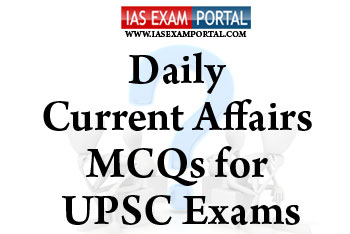Current Affairs MCQ for UPSC Exams - 09 FEBRUARY 2019
Current Affairs MCQ for UPSC Exams - 09 FEBRUARY 2019
Q1. Consider the following statements with respect to street vending regulation in the country :'
1) The Street Vendors (Protection of Livelihoods & Recognition of Street
vendors) Act in 2014 plays a very important role in protecting the rights of
urban street vendors and regulating the street vending activities.
2) The Support to Urban Street Vendors (SUSV) which is one of the components of
DAY-NULM, seeks to address the concerns of urban street vendors by creation of a
pro-vending infrastructure.
3) SUSVaims at addressing the vulnerabilities of the urban street vendors
through a multi-pronged approach includingsurvey of street vendors, issue of ID
cards, development of city street vending zones and vending plans, training and
skill development, access to credit and linkages to social security schemes.
Which of the above statements are true ?
a) 1 & 2 only
b) 2 & 3 only
c) 1 & 3 only
d) all of the above
Q2. The Department of School Education and Literacy has launched the “SamagraShiksha” - an Integrated Scheme for School Education as a Centrally Sponsored Scheme with effect from the year 2018-19.
The scheme subsumes which of the following erstwhile centrally sponsored
schemes :
1) SarvaShikshaAbhiyan
2) RahstriyaUchchatarShikshaAbhiyan
3) Mid Day Meal scheme
4) RashtriyaMadhyamikShikshaAbhiyan (RMSA)
5) Teacher Education (TE).
a) 1,2& 3 only
b) 3,4 & 5 only
c) 1,4 & 5 only
d) all of the above
Q3. Which of the following statements regarding the jurisdiction of CBI are true ?
1) In exercise of powers under Section 2 (1) of Delhi Special Police
Establishment (DSPE) Act, 1946, the Central Government constitutes a Special
Police Force for investigation in any Union Territory of offences notified under
Section 3 of DSPE Act, 1946.
2) The power and jurisdiction of this Special Force can be extended by virtue of
DSPE Act, 1946 to any other areas/State not being Union Territory for
investigation of any offences or classes of offences under DSPE Act, 1946 even
without the consent of the Government of that State.
3) Also constitutional courts can also entrust any case or class of case for
investigation in exercise of inherent jurisdiction even without the consent of
the respective State Government.
a) 1 & 2 only
b) 2 & 3 only
c) 1 & 3 only
d) all of the above
Q4. Consider the following statements with respect to nuclear waste disposal in India :
1) The solid wastes generated from nuclear facilities, depending upon their
radioactivity content are stored/ disposed of in engineered structures such as
stone lined trenches, reinforced concrete trenches etc far away from the nuclear
facilities.
2)The areas where the waste disposal structures are located are provided with
bore-wells in a planned manner which are routinely monitored to confirm
effective confinement of radioactivity present in the disposed waste.
3) The monitoring of various environmental matrices such as air, water, soil
etc., in and around the waste disposal facilities is carried out by independent
Environmental Survey Laboratories (ESL) of Bhabha Atomic Research Centre (BARC)
which are stationed at all the nuclear sites.
Which of the above statements are true ?
a) 1 & 2 only
b) 2 & 3 only
c) 1 & 3 only
d) all of the above
Q5. The AtalBhujalYojana (ABHY), a Rs.6000 Crore scheme, for sustainable management of ground water with community participation andenvisages active participation of the communities in various activities such as formation of ‘Water User Associations’, monitoring and disseminating ground water data, water budgeting, preparation & implementation of Gram-panchayat-wise water security plans.
The scheme is being implemented by Central government and which of the
following global organisations on 50: 50 basis ?
a) World Bank
b) Japan International Cooperation agency (JICA)
c) Asian Infrastructure Investment Bank
d) UNDP


